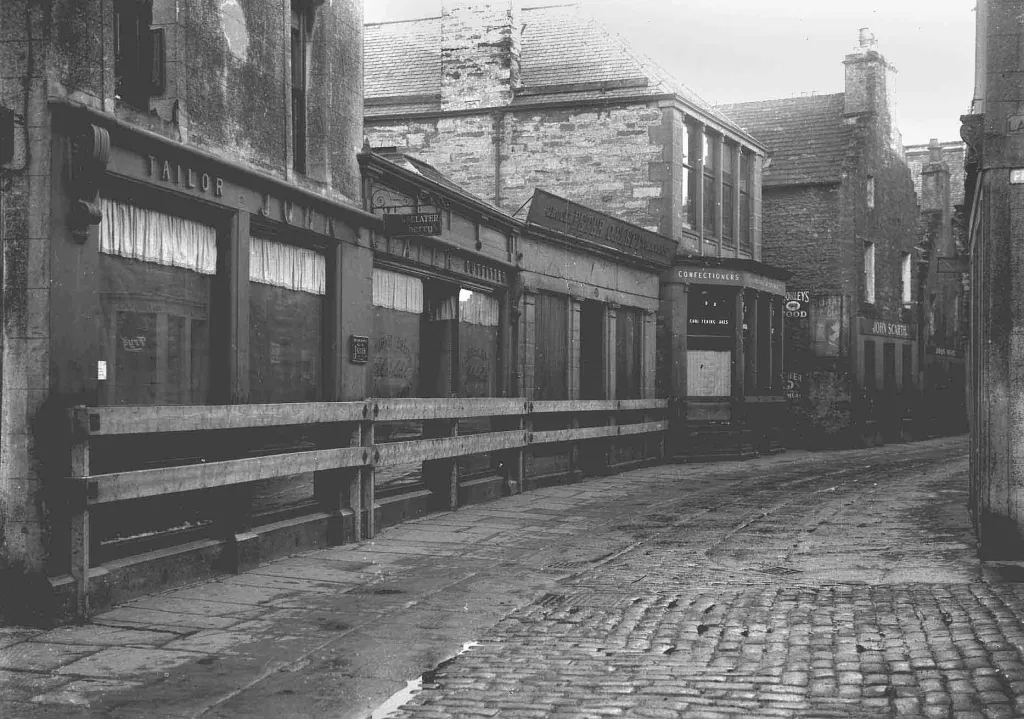Barbara Yule’s Ba’, 75th Anniversary of the Women’s Ba’, 1945/6-2020/1


The Ba’, as it is simply known (meaning ‘ball’) is not being played this year due to Covid-19. Christmas Day 2020 is the first time that the game has not been played since New Year’s Day 1945, as the Ba’ was suspended during both World Wars. But when it restarted after World War II, on Christmas Day 1945, there was a new addition to the ancient game – a Women’s Ba’.

The Ba’ was first recorded in Kirkwall around 1650, but it was said to have been an ancient game even then. It is likely that it dates back to at least Medieval Times when mass football games were played as part of the Yule celebrations. In the 1650s it was a fast-moving football game, using an inflated pig’s bladder as the ball, which was played on the ‘Ba’ Lea’, the area of rising ground to the east of St Magnus Cathedral. It later moved onto the streets of Kirkwall around 1800, but was not picked up and played in a rugby style scrum until the 1850s. This meant that the fragile inflated pig’s bladder was not suitable and it was instead made from panels of leather stitched together and filled with cork dust, which was used as packing in barrels of grapes. This style of game has survived until the present day.

The Ba’ had always been a male only sport, although women had unofficially joined in on occasions. There was a Boy’s Ba’ in the morning, usually at 10.00 a.m. and for a short time from 1892-1910 there was a Youth’s Ba’, played around 11.00 a.m., then the Men’s Ba’ at 1.00 p.m.
The Ba’ is ‘thrown up’ at the Market Cross in front of St Magnus Cathedral to the waiting crowd. There are two teams, Up-the Gate (Uppies) and Down-the-Gate (Doonies), who have to get it to their respective goals; the Doonies have to get it into the harbour while the Uppies have to get it to Mackinson’s Corner, where Main Street meets New Scapa Road. This was originally the site of Burgar’s Bay, the southern most part of the Peerie Sea, so it was a water goal for both teams until reclamation of the Peerie Sea during the 19th and 20th centuries. There are no restriction on numbers on either side and no rules. It has been suggested that the divisions was the area of Kirkwall that belonged to the Earl (Doonies) and the Bishop (Uppies). The term ‘Gate’ is from the Old Norse word for a street. What team you played for depended on where in Kirkwall you were born, or where you first entered the town. These days it goes with family tradition, as all babies are now born in hospital rather than at home.


The Ba’ was by no means unique to Kirkwall as most of the islands and parishes in Orkney had their own games. It was dying out by the early 20th century and World War I saw it end in many places. After the men returned from the war there seemed to be a lack of enthusiasm for it. A few islands and parishes restarted their own games, but gave up after a year or two. Only the Kirkwall and Stromness games continued. The Stromness game, which was a transplant from Kirkwall, ended in the 1920s when a large plate-glass window was installed in a cafe in the street and the local council refused to pay for any damages to it, so banned the game. Attempts to ban the game in Kirkwall, or move it to a designated field outside the town, failed. To this day you can see the barricades going over shop and house doors and windows on the run-up to Christmas. Outside of the season the round metal fittings, threaded to take a bolt, can be seen on shop fronts along the streets.



But Christmas Day 1945 was a see a change; if only for one season. After World War II the women demanded their own Ba’ game. It was greeted with hostility from the men, but amazingly it went ahead. The Orkney Museum is fortunate to have the first Women’s Ba’ that was played for in our collection. We display many Ba’s, as they not only show the different styles over the years, but also it is to honour the families who have donated them. The Ba’ is awarded to a long-serving player on the winning side at the end of the game. For a Ba’ playing family this is a huge honour and the Ba’ is treasured. It is a big thing for anyone to offer a Ba’ to the museum, and so it was for the Clitherow family of Edmonton, London. On the death of Barbara (nee Yule) in December 1999 her husband and children contacted the museum to offer us the Ba’. It was her wish that her Ba’ should “go home”.


On Christmas Day 1945 between twenty and thirty women gathered on Broad Street for the throw-up at 11.30 a.m. This was a controversial game and there was some hostility from the men. Soon after the game started the Ba’ was stolen by a man, so the New Year’s Day Ba’ had to be sent for. Before it arrived the missing Ba’ was found hidden in the graveyard of St Magnus Cathedral and was thrown-up for a second time. The two sides were evenly matched, but the Uppies got the upper hand and the Ba’ went up Victoria Street. The Doonies rallied and the Ba’ went back to Broad Street and down Castle Street into Junction Road. Here the Ba’ became stuck at the old police station (on the site of the new Orkney Library & Archive) and it was decided that it should be thrown-up a third time. This time the Uppies took possession of the Ba’ and it reached their goal just before 1.00 p.m. The Ba’ was awarded to Barbara Yule, Wellington Street, Kirkwall, who was regarded as being the leading player in the game.
The New Year’s Day Women’s Ba’, 1946, also went up in under five minutes and was awarded to Violet Couper, Watergate, Kirkwall, who was a student at the Kirkwall Grammar School. It was said that the Women’s Ba’ was a much faster-moving game than the Men’s Ba’, which relies on force to push the scrum along the streets.

This was to be the only season in which women had their own game. There was protests from men that it was ‘unladylike’ and it was abolished. An attempt to have a Women’s Ba’ in 2000, as part of the Millennial celebrations, was turned down by the Ba’ Committee.
Barbara Yule left Orkney soon after to make a new home for herself in London. Here she met John Clitherow, who was a cousin of her sister Rose’s husband. They were married in 1950 and had four sons and one daughter. They owned a grocers shop in Tottenham for several years, before it was bought by the council as the area was to be redevelopment. They bought another shop, opposite Tottenham Hotspurs football ground and later moved to a house in Edmonton in the London district of Enfield.
Barbara had to stop work due to arthritis. She was later diagnosed with amyloidosis in 1999 and died a few months later on 22nd December. It was always her wish that her Ba’ should return to Orkney, so in August 2000 members of her family took the Ba’ ‘home’ to Orkney and presented it to the Orkney Museum. As a tribute to his wife, her husband, John, wound a few strands of Barbara’s hair around the end panel of the Ba’.

The Ba that Barbara Yule won on Christmas Day 1945 was not a new one. The scarcity of materials meant that old Ba’ had to be played for until 1952. This Ba’ was originally won by Andrew Shearer for the Uppies on Christmas Day 1934. For him to donate his treasured Ba’ for a women’s game showed that not all men were opposed to the Women’s Ba’.
